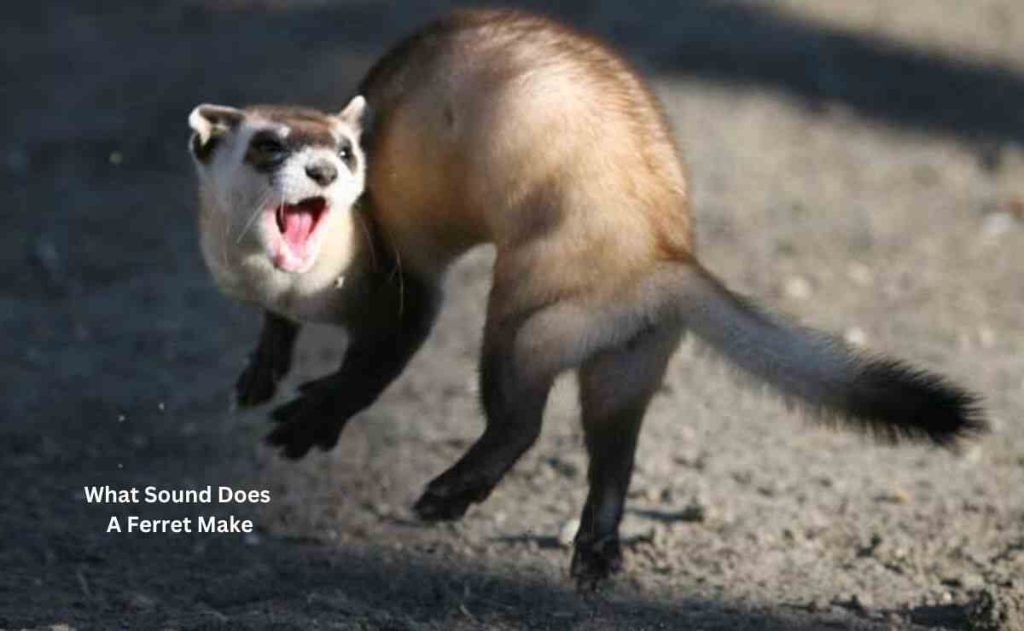Ferrets are fascinating creatures that have captured the hearts of many pet owners. These playful and curious animals are known for their mischievous nature, but have you ever wondered what sound does a ferret make?
Despite being popular pets, many people remain unaware of the vocalizations made by these furry little critters.
In this article, we will explore the various sounds that ferrets make, from their playful, chitters to their warning hisses. Whether you’re a seasoned ferret owner or simply curious about these fascinating creatures, understanding their vocalizations can provide valuable insight into their behavior and emotions. So, let’s dive in and discover what sound a ferret makes!
What Sound Does a Ferret Make?

Ferrets are vocal animals and can make a variety of noises. The most common sound they make is a short, high-pitched chirp or chitter. This noise is similar to the sound made by a bird and can be used to communicate with other ferrets or humans. Ferrets also make trilling noises when they are excited or content, as well as hissing sounds when they are scared or angry.
In addition to vocalizations, ferrets will also use body language to communicate. They may arch their back and puff up their fur if they feel threatened, or jump around and chatter their teeth if they are excited.
When playing with other ferrets, they may also perform a behavior called ‘dooking’, which involves making a low growling noise in their throat while jumping around.
Overall, ferrets make many different sounds that can help us understand how they are feeling in any given situation.
Do Ferrets Make Noises?
Yes, ferrets do make noises. They are vocal animals and can produce a variety of sounds such as chirps, clicks, and growls. A ferret’s vocalizations can be used to communicate with other ferrets or to express its emotions. Ferrets may also vocalize when they are feeling excited or scared, in order to alert their owners of their emotional state.
With these natural vocalizations, ferrets can also be taught to make certain sounds through repetition and reward-based training. This type of training is often used by owners who want their ferret to respond to commands or perform tricks. With patience and practice, it is possible for a ferret to learn how to bark like a dog or meow like a cat.
The ability of ferrets to produce different types of noises makes them an enjoyable pets for many people.
Can A Ferret Communicate with Its Owner By Making Sounds?
Yes, ferrets can communicate with their owners by making sounds. They are capable of producing a variety of vocalizations, including hissing, barking, and chattering. These vocalizations can be used to express a range of emotions from excitement to fear.
Ferrets may also use body language to communicate with their owners. For example, they may crouch down and flatten their ears when they’re scared or angry. They may also wag their tails when they’re happy or excited.
By learning to recognize your ferret’s various vocalizations and body language cues, you can better understand how it is feeling and respond accordingly.
Ferrets are quite communicative creatures that can easily bond with their owners through sound and body language.
Can Ferrets Communicate with Each Other?
Yes, ferrets can communicate with each other. They use a variety of vocalizations, such as chirps, squeals, and hisses, to communicate their needs and feelings. They also use body language to interact with one another. For example, they may rub their noses or groom each other to show affection and trust.
To communicate with their own species, ferrets can also recognize human voices and respond to commands. They are very social animals that enjoy interacting with humans and other animals. With proper training and socialization, ferrets can learn how to respond to basic commands like “sit” or “come” when spoken by their owners.
Ferrets are intelligent creatures that have the ability to communicate in various ways. Whether it is through vocalizations or body language, they can express themselves and understand what others are saying.
Do Ferrets Make Sounds When Happy?
Yes, ferrets do make sounds when they are happy. Ferrets have a range of vocalizations that they use to communicate with each other and with their owners. When a ferret is happy, it may make a chirping or purring sound similar to that of a cat. This sound is often accompanied by tail wagging and jumping around excitedly.
However, if your ferret makes these sounds while being held or petted, it could be an indication that the animal is content and enjoying its time with you.
They express their emotions through vocalizations and body language. If you pay close attention to your pet’s behavior, you can easily distinguish between noises of happiness and distress.
Understanding Ferrets Sounds
As a ferret owner, it is crucial to understand the sounds your pet makes. Ferrets are social creatures that communicate with each other through a variety of vocalizations and body language. By familiarizing yourself with their sounds, you can better interpret your pet’s behavior and emotions.
Ferrets make a range of noises, from playful chirps and barks to hisses and growls when they feel threatened or scared. High-pitched squeals or whines are signs of distress or pain, while soft clucking noises indicate contentment or relaxation. Understanding these different vocalizations allows you to recognize when your ferret is happy, stressed, or in need of attention.
Moreover, it is essential to know what sounds your ferret makes during specific activities like eating, playing, sleeping, and using the litter box. Common sounds produced by ferrets are discussed below.
1. Dooking
Dooking of a ferret is a behavior that is common among ferrets and is an expression of joy or excitement. It is often described as a “chattering” sound that the ferret makes when it is excited or happy. The sound is similar to a chirp but with more intensity and volume.
Dooking can also be used as a form of communication between ferrets, either as an expression of recognition or as an invitation to play. Ferrets may dook when they see another ferret they recognize, or when they want to interact with another ferret. In addition, some owners report that their pet ferrets dook in response to being petted or handled in a way they enjoy.
Dooking is usually seen as a positive sign that your ferret is content and enjoying life. If you ever hear your pet making this sound, it’s likely they are feeling happy and excited!
2. Hissing
Another way that ferrets communicate their feelings is through a variety of sounds, including hissing.
Hissing is a sound commonly associated with snakes or cats, but it’s also a sound ferret use to express themselves. When ferrets hiss, it’s usually because they feel threatened or afraid. This could be due to another animal or person invading their space or trying to touch them.
Hissing isn’t always an aggressive behavior; sometimes it can indicate that a ferret is feeling anxious or stressed. If you notice your ferret hissing more frequently than usual, it might be time to reassess their living environment and ensure they have enough mental stimulation and physical exercise.
3. Honking
The honking sound made by ferrets is quite distinctive and can be described as a cross between a hiss and a sneeze. It is usually produced when the ferret feels threatened or anxious, but it can also be an expression of excitement or playfulness.
Honking is one of the many ways in which ferrets communicate with each other and with their human companions. It is important for pet owners to understand this behavior so that they can respond appropriately to their furry friend’s needs.
4. Squeaking
The squeaking of a ferret typically indicates excitement, playfulness, or frustration. It’s not uncommon for these animals to become noisy while playing with toys or running around their cage. Some ferrets may also make this sound if they want attention from their owners or if they are feeling anxious due to an unfamiliar environment.
However, if you notice your pet continuously making this noise and appearing distressed, it could be a sign of illness and should be checked by a veterinarian.
Conclusion
Ferrets are unique creatures that have a wide range of vocalizations. They communicate through sounds such as hissing, chirping, and chuckling to express their emotions and intentions.
Although they are not known for being noisy pets, it is important to understand the different sounds they make to better care for them and recognize when something may be wrong.
By paying attention to their vocal cues and body language, we can provide ferrets with the proper love and care they need. So next time you hear your ferret making a strange sound, take a moment to observe, learn from their communication and act accordingly.
